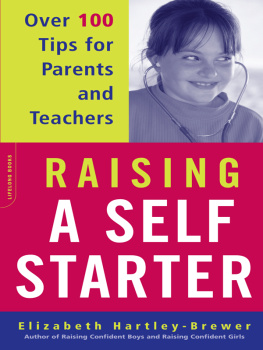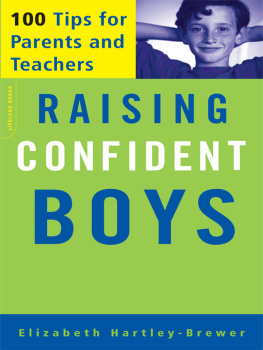First published in the United Kingdom in 1998 by Vermilion, an imprint of Ebury Press.
All rights reserved. No part of this publication may be reproduced, stored in a retrieval system, or transmitted, in any form or by any means, electronic, mechanical, photocopying, recording, or otherwise, without the prior written permission of the publisher. Printed in the United States of America.
Da Capo Press books are available at special discounts for bulk purchases in the U.S. by corporations, institutions, and other organizations. For more information, please contact the Special Markets Department at the Perseus Books Group, 11 Cambridge Center, Cambridge, MA 02142, or call (800) 255-1514 or (617) 252-5298, or e-mail .
1 2 3 4 5 6 7 8 908 07 06 05 04
Do not train boys to learn by force and harshness but lead them by what amuses them so they may better understand the bent of their minds.
Introduction:
The Great Balancing Act
Being a parent of young children at the beginning of the twenty-first century is hard, and it is not likely to get any easier. Parents are under fire. We have to make ends meet in an increasingly harsh and competitive world; we have to manage a variety of family arrangements and new roles; we have to compromise constantly, juggling our needs, wishes and opportunities with those of our partners and children. And all the while we are held responsible for an ever greater number of personal and social ills. Childrens underachievement is just one of these.
The stakes are rising for all of us as competition stiffens for places in sought-after nurseries, schools, colleges and, finally, for jobs. The pressure starts early. Childrens future behavior, life-chances, talents and fulfillment are significantly determined, we are told, by us in their early years. Of course we want them to get ahead, so we naturally want to get it right. It is a heavy responsibility for us to bear and an even harder one for us to carry out successfully.
In parallel with underachievement, and at the opposite end of the achievement spectrum, we are seeing a growing band of prodigiesvirtuosi violinists aged ten, international swimmers over the hill by the age of sixteen, single-minded tennis starlets, mathematical genii hothoused from age five, budding linguists who are starting preschool. With the right learning techniques, we are told, the sky is the limit for our children. If our child is not displaying notable talent in some area or an other by the end of elementary school, we can easily think we have failed in our duty to explore and exploit his potential. Guilt and pressure can become relentless.
The parent of a three-year-old mini gymnast was overheard asking the class coach, after only four weeks of attendance, whether her daughter was any good. If shes not got any talent, I dont want to waste my time bringing her here, she explained with no thought whatsoever for her childs enjoyment. Ferrying children from one after-school or weekend activity to another in case this is the sphere in which they will reach stardom takes not only time but also a great deal of money. There is a growing social and economic divide between the do-nothing children and the do-everything ones. While many children certainly do underachieve, having few opportunities to discover unexplored talents that can help them grow in confidence and pride, others are in danger of being overextendedmanaged, monitored and chivvied all day long. Social and educational one-upmanship is in danger of stifling the very creativity and motivation the new opportunities are designed to promote.
For many of us whose children merely plod along somewhere in the middle, it can be hard to know which way to turn. Of course we want our children to develop their talents, but when does encouragement develop into pushiness and secret glory-seeking on our part? When do high expectations and the pursuit of excellencesomething all schools are now asked to aim forlead to burnout? Is our childs lack of enthusiasm for some activity a genuine preference, or a result of low confidence and self-belief that need to be worked on? We are in danger of creating a world in which so much is expected that no one has time to rest, neither parents nor children. If we dont ask ourselves some fundamental questions, this search for fulfillment could create as many problems as it solves.
MOTIVATION
Children are people, not puppets, pigeons or performers. A parents prime responsibility is to nurture the whole child and to encourage self-motivation. Parents cannot have influence forever. Nevertheless, our early role is vital. With an eye always on our childs evolving autonomy and his need to believe in and manage himself, from the first day of his life we can help to create a motivational climate and energy for him that models good practice and creates a continuing momentum as we gradually withdraw, leaving him in full control. The same approach also works when a child loses heart and direction. The effective motivator does not rely on secret plans and clever tricks, to quote Roald Dahls childrens story TheEnormous Crocodile, but instead works openly to build a childs:
- self-belief
- self-efficacy
- self-direction
Self-belief means you have a clear and positive sense of your self and are able to view yourself in a favorable light, in many different ways. Children who lack self-belief are filled with a generalized self-doubt.
Self-efficacy exists when you feel capable because you believe and expect you can carry something out effectively. Children who lack a sense of self-efficacy feel hopeless and incompetent.
Self-direction means being able to work independently on tasks and problems. Children who lack the ability to direct themselves feel helpless and become dependent on others to take them forward.
Parents who demand too much and in the wrong way can do as much harm as those who demand too little. We have to aim for a healthy balance, for our sanity and for our childrens long-term success and emotional health. This is not a book for parents who desperately want their child to excel and are looking for some quick fixes. Neither does it provide quick or easy answers for those who have drifted away from their child emotionally, who only realize the consequence of this when any problems with motivation become serious. Certainly, there are ways to help rebuild relationships and regenerate motivation, but they are neither quick nor necessarily easy.
Maintaining a healthy balance is often easier said than done. Sometimes, we are blind to our personal style and the extent of its impact. Sometimes, when the point of balance needs to shift, it takes us a while to recognize this. Outside influences and pressures may become too strong to resist. At other times, we may have neither the emotional nor the financial resources to reflect or give much at all. Nonetheless, if we are able to think a little more deeply about our own motives, goals and tactics; acknowledge and respect our childrens feelings and perceptions, dreams and fears; and keep to some fundamental principles of good practice that enshrine the three guiding self beacons above, we are more likely to steer a successful middle course.











